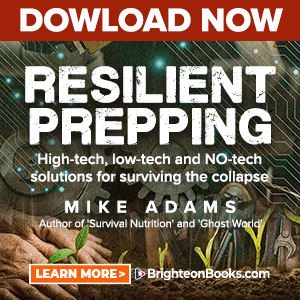Just a few moments of meditation a day found to have profound, near-instant benefits on stress reduction
Friday, July 11, 2014 by: J. D. Heyes
Tags: meditation, stress management, mindfulness

- Newly released JFK files reveal Pentagon's role in creating Lyme disease and covid in the same lab
- Trump nominates VACCINE ZEALOT Susan Monarez to lead the CDC, sidelining RFK Jr.'s reform efforts
- Obama accused of laundering USAID funds to fuel global protest movements, regime change operations
- HUGE: Putin claims 2020 election fraud in U.S. sparked Ukraine war, calls for peace talks with Trump
- Chris Rufo finally reveals abuse liberals unleashed on his wife and young kids...
- Deep State in disarray: Trump's funding freeze sows chaos, Democrats vow legal battle
- Trump shows his true colors
- STARDUST, a secretive Israeli-US startup, plans risky solar geoengineering experiment to BLOCK OUT THE SUN
- Trump's greatest betrayal so far: Accelerating Middle East wars, silencing dissent, and serving Zionist masters
- $2B Roundup verdict: A landmark blow to Bayer and a win for health freedom
- Outrageous government fraud: $312M in COVID loans went to children as young as 9 months old
- Festive flavors: The sweet history, nutritional profile and health benefits of pecan pie
- Elon Musk: Aliens could be here on Earth RIGHT NOW
- SWEET SABOTAGE: CIA's secret war on Soviet sugar revealed in JFK files
- Dr. Mike Yeadon releases 15-minute testimony - WATCH - about genocidal intent of COVID “vaccines”
- “Forever chemicals” in drinking water drive alarming cancer surge, new study warns
- Govt. agency closed by DOGE looked like a palace inside, with oil paintings fit for a KING...
- “Behind the Green Mask”: Rosa Koire exposes the hidden agenda of UN Agenda 21
- Newly released JFK files reveal Pentagon's role in creating Lyme disease and covid in the same lab
- Elon Musk: Aliens could be here on Earth RIGHT NOW
- Reclaim your health: How midlife exercise reverses years of inactivity
- Trump reverses course on Gaza plan, says “nobody is expelling Palestinians”
- EPA advisor admits the agency is funneling billions to climate groups ahead of Trump’s return to White House
- Big Pharma's $8 Billion bribery scheme exposed: how doctors are pushed to prescribe junk science, not heal
- Space war brewing? Russia threatens to destroy Starlink satellites
- A lack of integrity in Academia: Harvard professor found GUILTY of fraudulent research to promote CRT theory
- Survival 101: Effective EMF blocking techniques
- Rep. Nancy Mace introduces bill to ban biological males from female facilities on federal property
- Mike Adams Sermon 66: God will DESTROY ISRAEL for its wickedness
- Pilots report mysterious lights 'moving at extreme speeds' across Oregon skies
- 5 Simple steps to boost your brainpower: How to strengthen executive function in a distracted world
- Historian warns Israel may be entering an “IRREMEDIABLE DECLINE”
- Florida takes a stand: DeSantis proposes permanent ban on mRNA vaccine mandates
- RFK Jr.'s SSRI antidepressant investigation sparks liberal meltdown, exposes Big Pharma's dangerous game
- OpenAI whistleblower who dissented against how the company trained ChatGPT found dead
- Sugarcane extract superior to cholesterol-lowering drugs?
- EPA advisor admits the agency is funneling billions to climate groups ahead of Trump’s return to White House
- The Health Ranger releases “Vaccine Zombie” song and music video, using AI-animated zombies for the music video
- California's social media censorship law struck down: A victory for free speech or a threat to online safety?
- Dr. Mike Yeadon releases 15-minute testimony - WATCH - about genocidal intent of COVID “vaccines”
- The pandemic as a tool for INDOCTRINATION: Understanding “The Indoctrinated Brain” by Dr. Michael Nehls
- Mike Adams releases country western hit single: Goin’ Back in Time is Comin’ Home
- Mike Adams releases music poetry sensation: A Child of God
- RFK Jr. clears key hurdle: Sen. Susan Collins backs controversial HHS nominee, signaling a new era for health policy
- Florida takes a stand: DeSantis proposes permanent ban on mRNA vaccine mandates
- Unpacking the Lies That We’ve Been Fed – new song and music video released by Mike Adams, the Health Ranger
- Mike Adams releases new song and music video: Nothing More Disgusting Than a Globalist
- Congratulations to the FULLY UNVACCINATED as you resisted the COVID-19 PROPAGANDA MACHINE fueled by over $100 BILLION
- “Why we influenced the 2020 elections”: Facebook files reveal the coordinated effort to bury the Hunter Biden laptop story
- Michigan sheriff announces criminal investigation into 2020 election crimes, Dominion Voting Systems
- Israeli soldiers accused of even more torture and abuse in the West Bank
- Migrants are taking advantage of recent hurricanes to scam residents and loot their homes
- House Intelligence Committee calls for the ARREST and PROSECUTION of Dr. Anthony Fauci
- Peter Rost exposes Big Pharma corruption in his book “The Whistleblower: Confessions of a Healthcare Hitman”
- Red Cross issues warning to stop blood plasma donations from vaccinated people
- Scientists confirm: GENIUS brain function can be spontaneously unleashed in humans without any apparent cause
- EPA advisor admits the agency is funneling billions to climate groups ahead of Trump’s return to White House
- HYSSOP: What research reveals about the health benefits of this ancient holy herb
- Two containers with completed ballots fall out of truck in Florida
- Fully vaccinated about to see “tsunami” of illness and death, warns virologist
- Global leaders unite to clamp down on “misinformation” with UN-backed Cascais Declaration
- BREAKING: 2025 NDAA authorizes mandatory military draft of WOMEN across America… as Pentagon pursues global NUCLEAR war with both Russia and China at the same time
- Michael Yon warns of a ZIONIST TAKEOVER in Trump’s second administration
- BOMBSHELL: DNA testing kits are a SCAM to develop ethnic-specific bioweapons
- Ozempic and Wegovy weight loss drugs are injectable LIZARD VENOM PEPTIDES that may unleash a devastating wave of organ failure… side effects align with symptoms of SNAKE BITES
- Israeli soldiers accused of even more torture and abuse in the West Bank
- These 13 countries just signed an agreement to engineer a global FAMINE by destroying food supply
- NASA admits that climate change occurs because of changes in Earth’s solar orbit, and NOT because of SUVs and fossil fuels
- RFK Jr. clears key hurdle: Sen. Susan Collins backs controversial HHS nominee, signaling a new era for health policy
- Sermon 30: How Jesus reveals Caesar’s FAKE CURRENCY and FALSE AUTHORITY
- Coriander seeds: Ancient medicine backed by modern science
- Arizona officials claim Maricopa County needs 10-13 days to tabulate results of the election
However, new research from Carnegie Mellon University has become the first body of work to demonstrate that even brief mindfulness mediation practice - just 25 minutes a day for three consecutive days - can mitigate psychological stressors.
The research, which was published in the journal Psychoneuroenocrinology, examined how mindfulness medication can affect people's ability to be resilient under stress.
"More and more people report using meditation practices for stress reduction, but we know very little about how much you need to do for stress reduction and health benefits," said lead author J. David Creswell, associate professor of psychology in the Dietrich College of Humanities and Social Sciences.
Shorter meditation times equal good results too
To conduct the study, Creswell and his team of researchers had 66 healthy subjects ranging in age from 18 to 30 participate in a three-day experiment. Some of the participants underwent a brief mindfulness mediation training program. Then, for three consecutive days, for 25 minutes at a stretch, participants were given breathing exercises that helped them monitor their breath and pay closer attention to their present moment experiences.A second group of participants completed a matched three-day cognitive training program in which they were asked to critically analyze poetry in an effort to enhance problem-solving skills, said a press release from the university.
After the final training activity, all of the study's participants were asked to complete stressful math and speech tasks in front of evaluators who remained stern-faced. Each of the participants reported their stress levels in response to the stressful tasks, and they also provided saliva samples for measurement of cortisol, which is most commonly referred to as the body's stress hormone.
As noted in the press release:
The participants who received the brief mindfulness meditation training reported reduced stress perceptions to the speech and math tasks, indicating that the mindfulness meditation fostered psychological stress resilience. More interestingly, on the biological side, the mindfulness meditation participants showed greater cortisol reactivity.
"When you initially learn mindfulness mediation practices, you have to cognitively work at it - especially during a stressful task," said Creswell. "And, these active cognitive efforts may result in the task feeling less stressful, but they may also have physiological costs with higher cortisol production."
Meditation over medication
Creswell's research group is currently testing the possibility that mindfulness can become much more automatic and thus easier to use with long-term mindfulness meditation training, which could then result in reduced cortisol reactivity.In addition to Creswell, the research team consisted of Carnegie Mellon's Laura E. Pacilio and Emily K. Lindsay and Virginia Commonwealth University's Kirk Warren Brown, the university announced, adding that the Pittsburgh Life Sciences Greenhouse Opportunity Fund supported the research.
Writing in EmaxHealth, Lana Bandoim said that researchers will be further studying the long-term effects and benefits in more detail, but already experts are recommending that more people consider meditation (over medication) as a way of reducing stress:
Data from the American Psychological Association reveal that 77 percent of the people in the United States report feeling stressed. Money and work get most of the blame for creating stress in their daily lives, and 48 percent admit that it influences their life in a noticeably negative way. Meditation may not work for every person experiencing stress, but experts suggest it should be considered as an option.
Sources for this article include:
http://www.sciencedaily.com/releases/2014/07/140702122535.htm
http://www.emaxhealth.com
http://www.cmu.edu
Meditation at FETCH.news
Get independent news alerts on natural cures, food lab tests, cannabis medicine, science, robotics, drones, privacy and more.
Take Action: Support Natural News by linking to this article from your website
Permalink to this article:
Embed article link: (copy HTML code below):
Reprinting this article:
Non-commercial use OK, cite NaturalNews.com with clickable link.
Follow Natural News on Facebook, Twitter, Google Plus, and Pinterest
Science News & Studies
Medicine News and Information
Food News & Studies
Health News & Studies
Herbs News & Information
Pollution News & Studies
Cancer News & Studies
Climate News & Studies
Survival News & Information
Gear News & Information
News covering technology, stocks, hackers, and more



"Big Tech and mainstream media are constantly trying to silence the independent voices that dare to bring you the truth about toxic food ingredients, dangerous medications and the failed, fraudulent science of the profit-driven medical establishment.
Email is one of the best ways to make sure you stay informed, without the censorship of the tech giants (Google, Apple, Facebook, Twitter, YouTube, etc.). Stay informed and you'll even likely learn information that may help save your own life."
–The Health Ranger, Mike Adams













































